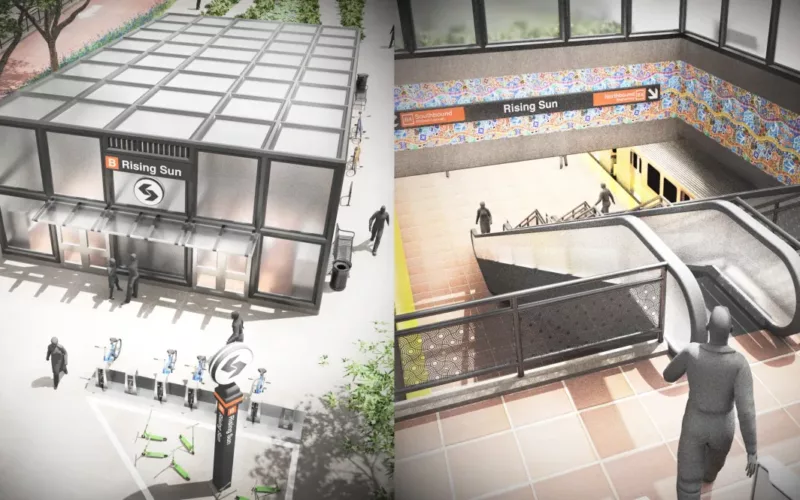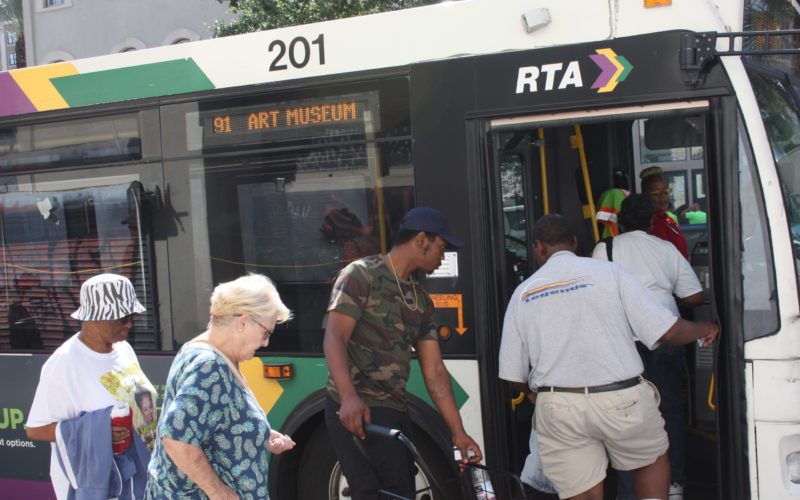

Rachel DiResto Executive VP of Baton Rouge-based Center for Planning Excellence with TransitCenter staff on New Orleans street car. Photo credit: David Bragdon
Economic and political opportunities in Louisiana make this a key moment to think strategically about transit. New jobs in the burgeoning petro-chemical sector and expected growth related to Gulf Coast recovery are increasing the need for transit to areas outside of the city and heightening the need for coordination of service that spans jurisdictions. TransitCenter recently spent a day in southern Louisiana, learning about advocacy efforts that are underway.
Since 2008, the management and operation of the Regional Transit Authority (RTA) has been delegated to the private sector multi-national Transdev, formerly Veolia. Struggling financially following Hurricane Katrina and unable to borrow funds during the financial crisis, the RTA Board of Commissioners entered into a disadvantageous contract in 2009 that gave them limited leverage over the private operator. The agency had only one full-time staff: a secretary that supported board activity. Every other staff member delivering public transportation in New Orleans reported to Transdev. Not surprisingly, in the five years that followed, the board could exercise little oversight.
Civic groups stepped up in this climate, advocating for the interests of riders and communities. Ride New Orleans’ report, The State of Transit in New Orleans: The Need for a More Efficient, Equitable, and Sustainable System, illuminated the effects of the transit service provided by Transdev. While New Orleans’ population in 2012 had reached 86 percent of what it was prior to Hurricane Katrina, only 36 percent of transit service had been restored. Profoundly, service cuts were found to be worst in the areas of greatest need, low-income neighborhoods predominantly inhabited by people of color, and where access to cars is limited.
There is reason to hope that change is on the way for New Orleans transit. Last month, the RTA board negotiated a new contract with Transdev which includes some accountability measures that should increase the operator’s responsiveness to rider needs, a major improvement over its last contract. The advocates weighed in on contract priorities, but they will still need to work to ensure that the public agency fulfills its commitments.
Advocates are now moving forward proactively to develop a vision for regional transit. Ride New Orleans is working collaboratively with Baton Rouge-based Center for Planning Excellence (CPEx) and others to realize shared regional objectives. We sat in on the first meeting between two coalitions pledging to collaborate on regional solutions: the Sustainable Transit Action Committee of New Orleans (STAC), and the Sustainable Transit Advisory Committee of Baton Rouge (STAC). These coalitions include representatives from government, transit agencies, a range of advocacy groups, and academia (e.g. AARP, Bike Baton Rouge, Baton Rouge Area Chamber, Capital Area Transit System, University of New Orleans, New Orleans City Planning Commission). Even before coming together for the first time, the STAC coalition of Baton Rouge built on lessons learned by its counterpart in New Orleans in its campaign for complete streets. Additional collaboration would allow the STAC coalitions to gain strength as they design campaigns to expand their impact and implement more sustainable transportation projects throughout both metropolitan regions.
Given the experience with post-Katrina RTA, advocates are already engaged in nitty-gritty tactics aimed at improving the capacity of leaders to make good decisions about transit and raising public awareness about the leaders that are selected. For example, advocates established continuing education requirements in state law for board members of regional transit authorities. Ride New Orleans and its partners successfully advocated for the creation of a Riders Advocacy Committee (RAC) at the Regional Transit Authority (RTA) to ensure that the riding public’s perspective is included. They are now pursuing the implementation of that policy. The election of a new governor this fall brings additional opportunities for change in the state of transit in Louisiana. We can’t wait to see how these intrepid advocates will continue to press for more benefits for the public in their public transportation system.
 To Achieve Justice and Climate Outcomes, Fund These Transit Capital Projects
To Achieve Justice and Climate Outcomes, Fund These Transit Capital Projects
Transit advocates, organizers, and riders are calling on local and state agencies along with the USDOT to advance projects designed to improve the mobility of Black and Brown individuals at a time when there is unprecedented funding and an equitable framework to transform transportation infrastructure, support the climate, and right historic injustices.
Read More “New Links” Charts a More Equitable Course for Transit in New Orleans
“New Links” Charts a More Equitable Course for Transit in New Orleans
A bus network redesign proposed for New Orleans promises to greatly expand transit access to jobs, reallocating service to neighborhoods where residents rely on transit the most.
Read More